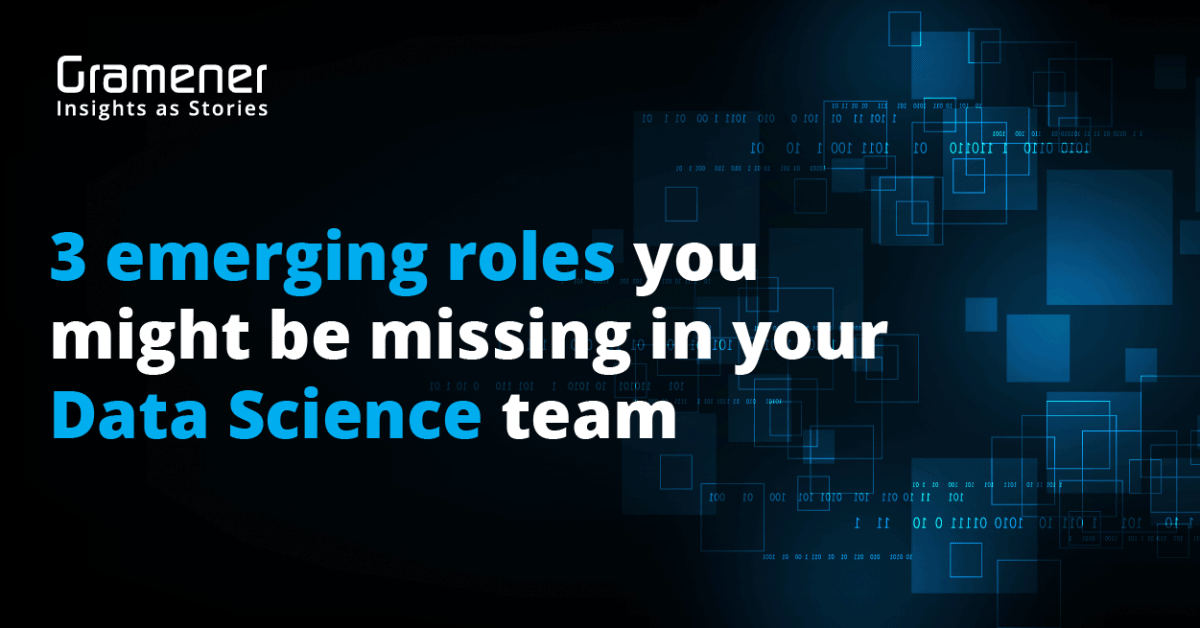When we began our journey a decade back as data science consultants and an analytics service provider, there were only a few trending roles in data science. Data scientists, BI experts, and data visualizers were a few common ones. Now, we are continually surprised by the new roles and job descriptions showing up in the field of data.
For 3 years in a row, data scientist was named as the number one job in the U.S. by Glassdoor. The ever-rising requirements in the field of data science will create 11.5 million job opportunities by 2026, says a report from the U.S. Bureau of Labor Statistics.
Such exponential industry growth has led to new trends in data science. Data science job positions are getting more formalized. There are stringent entry requirements and new data science titles are emerging on the scene.
Note: Watch the webinar on how to build successful data science teams
One skill to bind them all
Every major job role in a data science team demands specific skills. While an Information designer must be proficient with tools such as Illustrator or Sketch, a data scientist must have a flair for number crunching with Python or R.
However, there is one skill that every data science role must possess as a prerequisite to have a career in data science.
That skill is Data Science Literacy.
Being data literate is to engender a strong passion for data and numbers. It means getting comfortable with measuring things in a quantitative manner. The prospect should be able to make quick inferences with data.
Data consumption is one big challenge for organizations. Being data literate also means communicating inferences and insights from data easily. Someone doesn’t have to be a super designer, but a few tricks up the sleeve to visualize data are a bonus. What one does need, however, is data science literacy.
PRO TIP: Check out Gramener’s data advisory services and workshops for businesses to help them achieve data literacy and implement data as a culture across organization.
3 trending data science roles for your team
There are roles in data science with overlapping responsibilities. However, there are some distinct data science titles that have emerged as important for data science projects. In today’s scenario, there are plenty of opportunities for people from non-STEM backgrounds, who do not have coding skills.
Be it a startup or a large corporation, these emerging data science roles will come in handy for every data science project. Moreover, these roles also add strength while building high performing data science teams.
- Data Storyteller
- Behavioral Psychologist
- Data Ethicist
Data Storyteller
Some of us may forget the numbers or important keywords. But, we rarely forget stories. Humans are hardwired to remember narratives. That’s where people from journalism and literature come in — they have a flair for storytelling.
A good story backed with hard data is difficult to forget. A data storyteller contextualizes data by weaving the insights with the reasons behind them in the form of a narrative. That’s why conveying data insights as stories create a much larger impact on data-driven decision-making.
Behavioral Psychologist
Psychology is the new tool in the data science toolkit. Any product that goes out in the market is released after heavy research, survey and development. All these are done keeping into account the behavior of the potential customers for the product. Here’s where data science meets social science to fuse the economic context of the organization with the human dimension.
A behavioral psychologist can focus on the human side of the insights explaining why people do what they do. In trying to create ethical AI, social scientists allow data scientists to understand the real-world impact of their algorithms and any biases they may have.
Note: Check out the podcast on why data scientists need social scientists
Data Ethicist
Data ethicists are yet to receive the hot status of data scientists. The role is designed to consider the ethical implementations of data practices into business processes. A Data Ethicist focuses on efforts and insights around identifying and rectifying the flaws and abuses in our social order around human data privacy, human data ownership, and human data ethics.
People from domains such as law and humanities come together with data scientists to ensure trust and fairness in the data science teams and processes.
Distinct roles add value to a data science team
“Building and executing successful, ethical, and insightful AI solutions requires a well-rounded data science team, and not just a few idealistic data scientists who can do it all,” says Ganes Kesari, Gramener’s Co-founder and Head of Analytics.
To implement data as a culture in their everyday business processes, organizations are finding a need for each of the roles. Businesses need to understand the ways and talents that can offer them the most from data. They must simplify data consumption and hire people for teams who can fill this gap. In the meantime, being prepared to fight for talent and expertise is essential to stay ahead of the competition.

Thanks for sharing such an informative post on Data science training, was loooking for this info from really a long time.